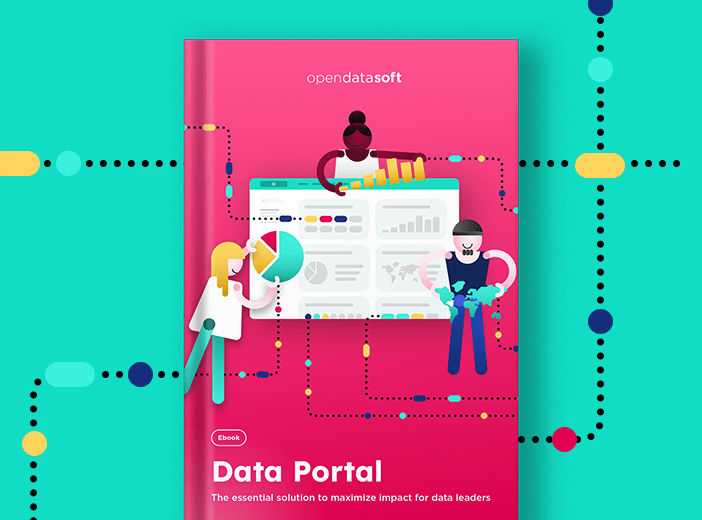The importance of data portals to accelerating success in transport and mobility
Driven by the need to decarbonize, increase efficiency and meet changing customer needs, the transport and mobility sector is undergoing a rapid transformation. Data is at the heart of this, with data portals critical to building an effective, sustainable and customer-centric transport ecosystem.

We all rely on transportation and mobility providers to get us safely and swiftly from A to B, delivering a seamless and reliable customer experience whatever mode of transport we choose. Providers themselves need to meet evolving customer needs, increase efficiency, reduce costs, embrace innovation and successfully decarbonize if they are to thrive in a rapidly transforming world.
Data is the fuel for meeting all of these challenges across the transport ecosystem. Companies therefore need to focus on collecting and sharing their data seamlessly with all their audiences through internal and external data portals if they are to achieve their objectives, now and in the future.
The challenges facing transport and mobility providers
Transport and mobility providers face a range of key challenges to operating effectively and efficiently while meeting customer needs:
Understanding changing customer requirements
Customers today expect more from mobility providers and operators need to understand and meet their requirements, innovating with new services designed to attract and retain their custom.
Becoming more efficient and doing more with less
Mobility providers need to maintain their fleet and operating infrastructure against a backdrop of rising costs and changing travel patterns. They must drive greater efficiency across all their operations, without compromising safety or passenger comfort.
Need to become more digital
Today’s connected passengers expect to be able to interact digitally with transport providers, while becoming more digital also helps operators increase efficiency by removing manual, paper-based processes.
Deliver on regulatory requirements
Many transport providers operate within regulatory frameworks, requiring them to regularly report on their performance against objectives to regulators such as city governments, transport authorities, national or international regulators.
Show progress towards decarbonization
Transport is a major source of emissions, meaning operators need to show their progress towards net zero to build trust with customers, play their part in decarbonization, and justify their activities.
Manage growing data volumes
Effectively managing the growing amounts of data flowing around transport companies is vital to success, but can be difficult given it is stored in departmental silos, and in different formats across the organization.
Work with a wider ecosystem
Traditional, standalone travel has been replaced by a more integrated, end-to-end approach. This requires greater collaboration across the transport ecosystem, even amongst providers that previously saw themselves as competitors.
How data portals enable transport providers to achieve their objectives
Centralized data portals bring together transport provider information in key areas such as infrastructure, passenger services and corporate transparency (such as incidents and remuneration). They then make relevant data easily available internally to staff and externally to customers and partners, either displayed through visualizations or in formats that can be easily consumed, such as via apps and business solutions. They are at the heart of building data-driven transport ecosystems, enabling operators to deliver on their goals in seven major ways:
Enabling greater customer-centricity
Customers want to be kept informed and that providers are open and transparent. Open data portals provide access to performance and incident information through easy to use visualizations. For example Swiss train operator SBB shares the location of platforms, lifts, and access ramps to help people with mobility concerns to access facilities more easily and better plan their trips, while publishing train occupancy levels to help everyone to find space on their train.

Increasing internal efficiency
Transport providers are often very large organizations, with thousands of employees and a wide variety of assets, from buses and trains to track, signals and ticketing infrastructure. Managing and maintaining infrastructure is a major part of operations and can involve multiple teams. Sharing relevant data internally within the organization creates a single source of truth for everyone, increasing efficiency and enabling collaboration.
SNCF Réseau, part of the French national railway operator, selected the Opendatasoft platform for use by its Digital department (including Strategy, Transformation, Digital Acceleration and Data Department teams). Opendatasoft is used to quickly deploy data-based apps and services to meet the needs of SNCF Réseau’s different business lines, improving monitoring of network management operations.
Demonstrating effective performance
Many transport operators are mandated to share their data by national or regional regulations. These include information on performance, punctuality and other Freedom of Information requests. While this could be delivered through static PDF reports, making it easily available through compelling visualizations on an open data portal is much more transparent and engaging, as well as reducing administrative costs.
Belgian railway network owner and manager Infrabel has taken this proactive approach to demonstrating performance, collecting and sharing open data through a portal with all of its stakeholders. This includes an interactive, monthly punctuality dashboard for all its services, showing recent against historic performance. This is accessible and available via the main Infrabel website and is also shared with the media, providing them with accurate information for their stories.

Building end-to-end mobility ecosystems
Sharing data across the mobility ecosystem increases passenger numbers by making their journeys seamless, while also opening up new revenue opportunities. Many transport operators, such as bus companies, make their data available both via data portals and APIs, enabling the creation of user-friendly, comprehensive apps that improve the passenger experience.
It also increases transparency and efficiency by sharing data with key stakeholders, such as regulators through one-stop shop data portals where information is easy to discover and access. This could be delivered as raw data available to browse or automatically updated via APIs.
For example, in Switzerland there are nearly 300 companies working in public transport, each with data that can be used by others to improve existing services or create new ones. By sharing its data, SBB is helping drive this ecosystem, underpinning collaboration and innovation.
Improving safety through information sharing
Transport companies rightly have to meet the highest safety standards and are committed to continually improving the welfare of passengers and the wider environment. Sharing relevant performance and infrastructure data through dashboards and APIs on their data portals provides all stakeholders with the information they need to stay safe and avoid accidents.
As part of SNCF’s plan to improve safety it is committed to avoiding collisions between animals and its trains. As part of thos it has created a dedicated app where the public can report animal sightings near train tracks, adding to an interactive dashboard. This provides an early warning of potential dangers for drivers and protects wildlife from preventable accidents.
Build transparency and trust
The public and officials have high expectations around the performance of transport operators. They may not understand the complexity of their operations or any external factors (such as bad weather or industrial action) that impact performance. It is therefore important to build transparency and trust with all stakeholders – data portals provide verified information to help create greater understanding while holding operators to account.
This covers more than mandated performance targets – for example Infrabel also shares its sustainability goals via its open data portal, showing progress against them on an ongoing basis. It also shares data through its portal with universities, researchers and government statisticians, who use it for studies and reports.

Driving innovation and new mobility services
New technologies and services, such as autonomous vehicles and e-bikes can dramatically improve the transport experience. However, as with all new innovations it is important to build trust with communities, demonstrating their value and levels of safety.
The CASSI shuttle trial shows how data sharing can support innovative new types of transport. A partnership between the North Carolina Department of Transportation and the Town of Cary, the trial saw the introduction of an all-electric self-driving shuttle to the town’s Bond Park. All of the data around the project is available on Cary’s open data portal, through dashboards and data stories, providing a completely transparent view of performance, including number of riders, reasons for service disruption and most popular times and days of week for usage. All of this helps build confidence and drive improvements in the technology in a real-world setting.

Accelerating journeys through data portal
Data is crucial to integrating the entire transport sector, from bus and train operators to those offering innovative new mobility services, increasing efficiency, customer-centricity, collaboration and greater transparency. Centralized one-stop shop data portals are at the heart of effective data sharing, underpinning a vibrant, sustainable transport ecosystem for all.




